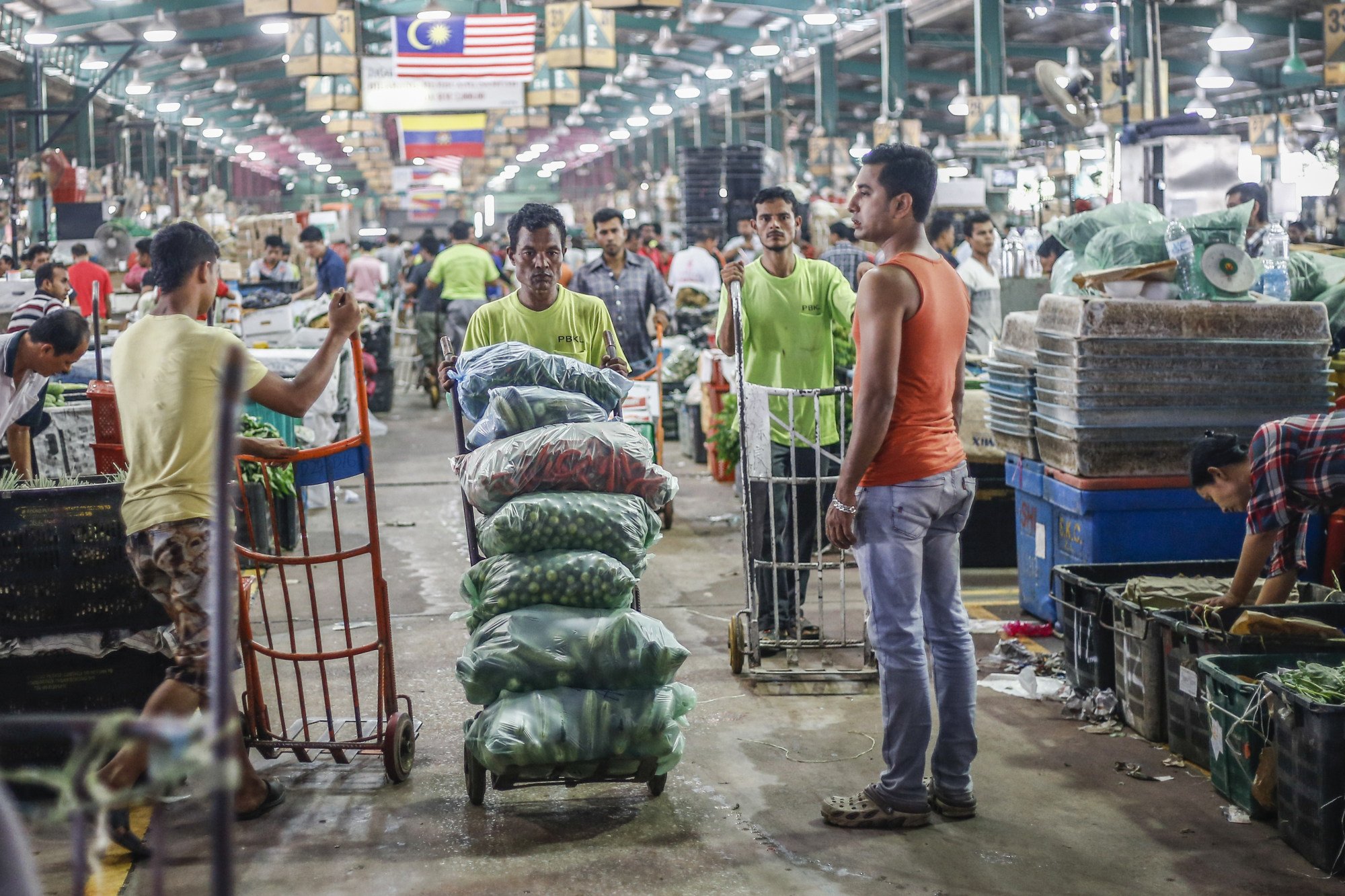
As Malaysia’s door closes on low-paid migrant workers, companies scramble for staff
- A freeze on new migrant-worker applications in Malaysia has employers warning of looming labour shortages and having to turn to the black market
- Yet hundreds of thousands of migrants are already in the country and can’t find legal work – duped into moving with promises of non-existent jobs
Malaysia to slash migrant workforce amid vitriol, Bangladeshi job scam crisis
The new rules were introduced, at least in part, because of the fallout from a major job-scam crisis that saw some 200,000 workers, mainly from Bangladesh, arrive in Malaysia only to find the vacancies they had paid several thousand US dollars to fill did not exist.
Earlier, the Malaysian Indian Restaurant Owners Association (Primas) had issued a joint statement with 22 other trade groups calling for the government to push the deadline back to September, arguing that filling job vacancies had been difficult and the freeze on hiring migrant workers would force businesses to turn to the black market for labour.
“It is difficult to find workers in source countries within such a short time and employers will likely panic as a result, leading them to seek out the services of illegal agencies,” said Primas president Govindasamy Jayabalan in the statement. “This could lead to employers hiring less qualified foreign workers out of desperation.”

April 21 now marks the last day employers can get visa approval for new migrant workers, ahead of a May deadline to bring them into the country.
According to the government, the decision to halt recruitment is based on the metric of not allowing migrant workers to exceed 15 per cent of the total workforce by 2025, with the country of around 34 million already hosting some 2.17 million foreigners.
Speaking in parliament on March 26, Human Resources Minister Steven Sim defended the hiring freeze, saying government quotas had already almost been hit.
“Any decision on reopening of the foreign workers quota will be made after the government has the full details of the quota of workers who have not entered the country by May 31,” he said.

Malaysia has been heavily reliant on migrant workers since it began to rapidly industrialise in the late 1980s, with many locals nowadays shying away from jobs in sectors such as agriculture and construction, which are perceived as “migrant work”.
As businesses rushed to bring in foreign workers before the hiring deadline, immigration offices have been overcrowded and the online Foreign Workers Centralised Management System has struggled to cope with demand, according to people familiar with the matter.
For migrant rights activist Adrian Pereira, enacting a blanket freeze on hiring is not only “dangerous”, it is counterintuitive to having a quota system in the first place.
Malaysia rises up expat list as golden visa, anti-Israel stance become drawcards
“The moment movement is stopped, there will be more problems: traffickers will start getting into action, smuggling will increase,” he said, calling the freeze a “mad idea”.
“If the government agencies who set the quotas do their job, why do they need to freeze?”
Pereira panned the government’s move as a “knee-jerk reaction”, coming as it did a little over a year after most restrictions had been lifted on employers hiring from a list of 15 countries to fill a labour shortage stemming from the pandemic.

Since then, more than 1 million quota applications for foreign workers have been approved, mostly in the construction and manufacturing sectors, followed by plantations and agriculture.
It also led to a glut of migrant workers being brought into the country with promises of non-existent work. They number upwards of 200,000, according to migrant activist Andy Hall, with many now undocumented, destitute and stuck in debt bondage – a form of modern slavery.
“They are desperate for any jobs or income they can get, to survive, to eat and to remit money to their families to pay off the extortionate and ever-increasing interest on their debt” that can reach as high as US$6,000 per person, Hall said.
But few employers in Malaysia are likely to hire such workers, he said, as their debt and destitution makes it difficult to draw up legally binding employment contracts due to an assumed lack of informed consent.
Malaysia has got itself into a real mess here with a systemically corrupt migration management and recruitment system devoid of the rule of law and full of impunity
Earlier, 171 Bangladeshi workers marched to a police station in the oil-and-gas hub of Pengerang, Johor state, to lodge a report against their employers who they accused of similarly duping them into coming to Malaysia.
“Malaysia has got itself into a real mess here with a systemically corrupt migration management and recruitment system devoid of the rule of law and full of impunity,” Hall said.
The problem, however, is hardly new.
Malaysia firm probed for human trafficking after foreign workers found abandoned
In a food court in Petaling Jaya, west of central Kuala Lumpur, stall owner Sarah laments having to go back into the kitchen to run things after her Bangladeshi employee Ibrahim decided to take advantage of an amnesty offer, which allows undocumented migrants and those who have overstayed their visas to leave Malaysia without prosecution or any questions asked.
“Ibrahim used to run this place all on his own, but now – as you see – my whole family is helping out to keep the business running,” said Sarah, who did not give her real name for fear of repercussions from hiring an undocumented migrant.
Admitting what she did was wrong, she said it was the best option she had.
Like most undocumented workers, Ibrahim came to Malaysia legally as a construction worker before being swindled by his employers, leaving him destitute with no legal paperwork and having to scramble for illegal employment.
His friend Bilal at the drinks stall nearby is similarly taking the amnesty offer, saying that he is tired of dodging immigration raids after so long.
“I’ve been detained many times, I had to pay money to be released,” he said. “But enough, this is my last month here.”

